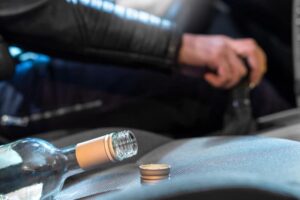Addiction: When Will It End?
If you have ever tried stopping a habit, you know that it is a pretty difficult task. Something as simple as biting your nails can feel impossible to overcome. Most people make constant resolutions to go to the gym or eat healthier, yet struggle with such simple habits. Now think of it in terms of an addiction. Learning to end an addiction is a much greater challenge and you have to know more about how it starts to get it to stop.
The thing about addiction is that it can involve a habitual behavior, but it can also have a physical component. If you want to learn more about the technicalities, the Association for Psychological Sciences lays it out nicely here.
Our bodies can come to rely on substances to the point that it causes physical pain when we deny ourselves these substances. Imagine feeling absolutely miserable every time you didn’t bite your nails, even if you mentally wanted to quit. You feel so sick that you give in just to relieve some of the symptoms. That’s what addicts face each and every day.
So what Besides Physical Reactions make Addiction so Difficult to Overcome?
Addiction is like a circle. You can choose any point as the start, but there is no end, it just keeps going around and around.
What makes addiction so difficult is that there is no distinct end point. Instead, it works in a cycle and when one part is triggered, the next continues and so on. The only way to stop the cycle is by the addict making a conscious decision to stop, but this is far from easy. Just like deciding to go to the gym one day doesn’t make you healthy and fit, making the decision to quit drugs or alcohol is 100 times harder.
Though addiction behaves in a cyclical manner, we still can decipher three distinct parts that form the circle and they are a part of every kind of addictive behavior.
You will find:
- Initial triggering event
- Reaction/Response
- Result
Let’s go through each one. So first we are affected by the initial trigger. This trigger could be caused by anything from bad news, approaching a deadline at work, or even a break-up. The trigger can be almost anything, but what defines it is the common result from the trigger, feelings of stress and anxiety.
So now that we have been triggered to feel stressed, we choose to combat this feeling by reacting to it. We take steps to alleviate the feelings we are having and this is where we start to get into trouble. For addicts, this response involves their addictive behavior be it drugs, alcohol, or even gambling. The response we use makes us feel temporarily better as if the initial trigger never happened at all.
We don’t just get triggered by something, react, and then continue on as normal until we are triggered again. The harsh reality of the cycle aspect means that there is a third step, and this is the result. I mentioned above that the reaction provides only temporary relief.
The result is that the effects of the reaction wear off (usually pretty quickly) and we can be left feeling worse than when we started. As you would guess, for addicts, this causes another triggering event that they have a desire to alleviate as soon as they can.
Now the result might be delayed in some instances. For example, if we have an individual addicted to heroin and they make a decision that they are going to stop, the result might be delayed when they are experiencing symptoms of withdrawal.
People with addictions might mentally want to stop the addictive behavior, but physically, they can’t withstand the withdrawal so they give in and use again. This is why fighting addiction is such a challenge.
If Addiction is such a Powerful Cycle, how to we Stop it?
This is where there is much debate in the addiction recovery community. Everyone seems to have their own beliefs on the best method for a successful recovery, but if we look at it from the fundamental level of addiction being a cycle, it will show us the best way to treat it.
The approach that rehab centers take to treating addictions can have an impact on whether or not recovery is successful. Many treatment plans involve getting their patients to stop the reaction phase. Essentially, they are asking the addicts to mentally ‘say no’ to their addiction which as we discussed, is a lot harder than it seems.
They tend to focus all of the attention on choosing not to give into the addiction and often lose sight of the other stages in the cycle. This means that the addicts have to have very high will-power and self-discipline which makes it easier to relapse. Let’s face it, no one is perfect and no one will be able to control themselves to that extent.
In order to get the best treatment possible, we need to be focusing on all of the stages in the cycle. People need to understand what triggers them, they need to stop reacting to the trigger, and finally, if they stop the reaction they won’t get the end result of feeling worse and starting the initial trigger.
The Road to Recovery
The best treatment practices will focus the attention on finding the root cause to the initial trigger, which is what we value here at Transitions Recovery. Since the trigger itself causes feelings of stress, this is no easy task. Each person has to be willing to dig deep into themselves and their pasts before they can start to heal. Addiction can persist for years and finding the initial trigger can take a long time.
When we find out what is causing the trigger, then we will be able to either learn to avoid it or work through it. It challenges us to get to know ourselves on a behavioral, emotional, and intellectual level and in this way, we get to heal more completely than just shutting off the reaction phase.
People are always surprised to find that when they actually heal themselves in this way they significantly lessen the need to indulge in their addictive behavior. If you take out the root cause, there will be nothing else left to grow. With this is mind relapses still can happen, but recovery becomes less of a test of willpower and has a much greater chance at remaining permanent.
In order to battle addiction, we need to know exactly how addiction works. The cyclical nature of the trigger, reaction, and result make it a tough thing to beat. But knowing this lets us fight addiction from all phases and increases our chances of a successful recovery.
Know someone that could use some help? Feel free to reach out to us.

















